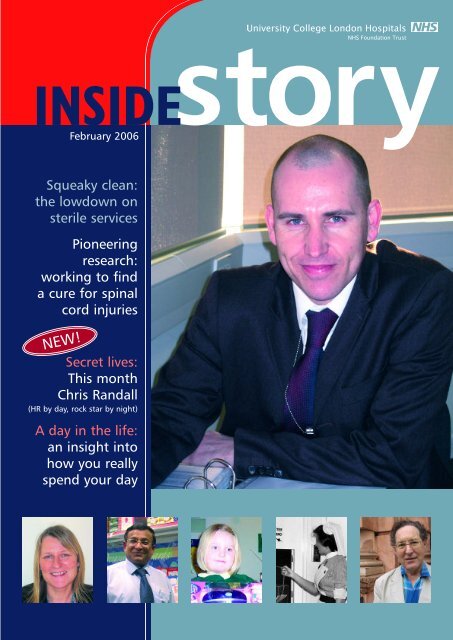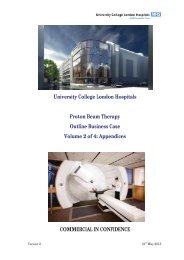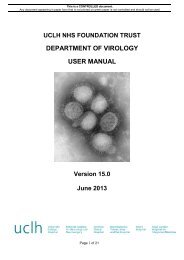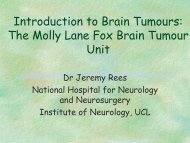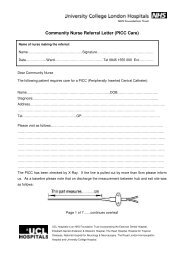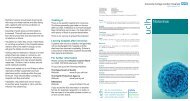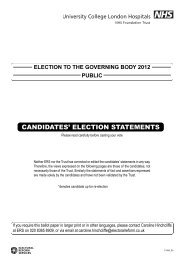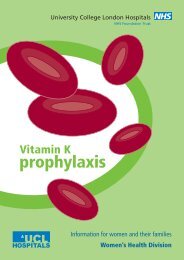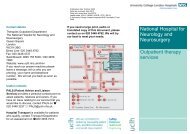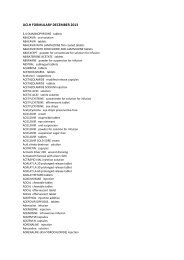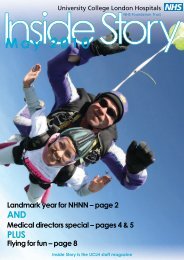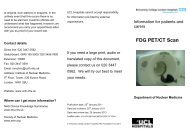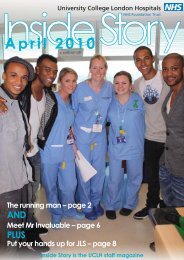Squeaky clean - University College London Hospitals
Squeaky clean - University College London Hospitals
Squeaky clean - University College London Hospitals
Create successful ePaper yourself
Turn your PDF publications into a flip-book with our unique Google optimized e-Paper software.
story<br />
INSIDE<br />
February 2006<br />
<strong>Squeaky</strong> <strong>clean</strong>:<br />
the lowdown on<br />
sterile services<br />
Pioneering<br />
research:<br />
working to find<br />
a cure for spinal<br />
cord injuries<br />
NEW!<br />
Secret lives:<br />
This month<br />
Chris Randall<br />
(HR by day, rock star by night)<br />
A day in the life:<br />
an insight into<br />
how you really<br />
spend your day
welcome<br />
A one-stop success<br />
Winning ways: Regional Care Advisors,<br />
Pat Morton (fourth from left) and Delia Balan<br />
(third from right) at the awards ceremony<br />
The Huntington Disease Association’s<br />
regional care advisory team has won the<br />
prestigious ‘long-term conditions’ category<br />
at the Department of Health’s Health and<br />
Social Care Awards. The award is for their<br />
role in multi-disciplinary clinics for patients<br />
with, or at risk of, Huntington’s Disease<br />
(HD), an inherited neurodegenerative<br />
disease. Held at the NHNN, the advisors<br />
work alongside clinical, nursing and<br />
administrative staff to provide a ‘one stop<br />
shop’, offering specialist advice and<br />
knowledge in one place, at one time.<br />
Dr Sarah Tabrizi, lead clinician says: “The<br />
work of the care advisors is an excellent<br />
example of the benefits of linking the care<br />
of patients with HD in an outpatient<br />
hospital setting with their care at home<br />
and in the community. Their input has<br />
been essential to the success of this<br />
service.”<br />
Childcare co-ordinator<br />
Gill Tew calls it quits<br />
Gill Tew is one of 20<br />
members of staff<br />
who have joined the<br />
Trust’s eight-week<br />
‘Stop Smoking Staff<br />
Support Programme’<br />
– and she has agreed<br />
to keep Inside Story<br />
informed of her<br />
progress! Gill said: “I’ve been smoking for<br />
29 years but want to give up because I feel<br />
my health would benefit, and my children<br />
keep nagging me! I’ve joined the<br />
programme because I think it will be easier<br />
to give up with lots of support, rather than<br />
do it on my own”. With a success rate of<br />
up to 70%, the programme takes a holistic<br />
approach, coupled with two clinically<br />
proven methods for stopping smoking,<br />
and is part of the Trust’s commitment to a<br />
smoke free environment. Good luck Gill!<br />
Find out more about the programme<br />
from Caroline Douglas, stop smoking<br />
services manager on x 9431<br />
(caroline.douglas@uclh.nhs.uk)<br />
Previously a radiographer at<br />
Diana Princess of Wales Hospital,<br />
Lincolnshire Uzoamaka Ikwumelu<br />
recently moved to <strong>London</strong> and has joined<br />
the imaging department at UCH in the same role. Her job<br />
is varied, and includes taking general x-rays in outpatients,<br />
inpatient wards, and A&E, as well as taking part in special<br />
investigations. Uzoamaka is enjoying her new role so far:<br />
“The team have been so welcoming, showing me around<br />
and teaching me how to use the new equipment. I am<br />
really looking forward to developing myself here”.<br />
Bankole Atiba will be recognised by many in the patient<br />
booking department at the NHNN, where he has been<br />
working on a temporary basis for a year. In his new role as<br />
patient booking co-ordinator, Bankole hopes to continue to<br />
contribute to the team's successful record of significantly<br />
reducing the number of outpatients who do not attend<br />
their appointments. Bankole is looking forward to focusing<br />
on the hospital's policy of giving patients a choice of<br />
appointments: “I have really enjoyed working in this<br />
department. The team are terrific with everyone working<br />
together and there is a warm atmosphere at NHNN. I have<br />
also been impressed by the high standard of care delivered to patients”.<br />
Kenny Mole has joined the pharmacy at UCH as medicines<br />
information pharmacist. His role is diverse and includes:<br />
providing medical information to a range of people<br />
including pharmacists and health professionals, evaluating<br />
medicines use within the hospital, providing a ward<br />
pharmacy service and helping to teach junior pharmacists.<br />
Previously at Northwick Park Hospital, Harrow in a similar<br />
role, he says: “Everyone seems really friendly and have been<br />
extremely welcoming. I’m really looking forward to getting<br />
started and stuck-in to the role”.<br />
It’s all change for Nathalie F-Robertson who recently<br />
moved to <strong>London</strong> from Canada and has joined the Trust<br />
as assistant to the European Group for Blood & Marrow<br />
Transplant (EBMT) Registry. The EBMT is a huge database<br />
containing transplant information from throughout<br />
Europe which is regularly used for research purposes.<br />
Nathalie’s role is to assist and support the statician data<br />
manager in collating data for it. On joining the Trust,<br />
Nathalie says: “It’s an exciting department to be working<br />
in. After moving countries, it is reassuring to be working<br />
in such a nice environment”.<br />
Board headlines…<br />
new faces<br />
at UCLH<br />
Highlights of January’s board discussions included… The development of the<br />
‘clinical efficiency project’ to improve the way we provide services to patients…<br />
The success of the interim discharge policy in ensuring we meet the target of<br />
98% of patients waiting no more than four hours in A&E… The donation of<br />
outdated equipment from The Middlesex Hospital to Mulago Hospital in<br />
Kampala, the main teaching hospital in Uganda.<br />
Papers for the Board of Directors’ meetings are on our website – follow<br />
the link from the Trust Management section of Insight.<br />
2
news<br />
First meeting of the<br />
‘Staff Network’<br />
Webwatch:<br />
new Insight<br />
people directory<br />
goes live<br />
You can find contact details for any of<br />
our 6,000 staff at the click of a button<br />
now that the new people directory has<br />
gone live on Insight. You can find the<br />
directory via a link on the left-hand<br />
column of the Insight home page.<br />
New features of the directory include an<br />
editing tool which allows each user to<br />
update their own profile and an option<br />
to include a photograph of yourself.<br />
But there’s a catch – the directory will<br />
only be as good as you make it, because<br />
each member of staff will be responsible<br />
for updating their own details.<br />
How to edit your personal profile:<br />
1 Search for your name using the<br />
people search in the blue bar<br />
running across the top of the page<br />
2 Click on your name to open your<br />
profile page<br />
3 Click on the 'Edit my details' button<br />
on the right-hand side of your<br />
profile page<br />
4 Change your details as required (you<br />
can add a photograph of yourself if<br />
you like)<br />
5 Finally, click on the ‘Validate<br />
changes’ button on the right hand<br />
side to save your details<br />
If you can’t find your profile, or are<br />
unable to edit your details please e-<br />
mail: webmaster@uclh.nhs.uk / x 5165<br />
with your UserID (the name you use to<br />
login to your PC e.g. ASMITH). PLEASE<br />
DO NOT SEND YOUR PASSWORD – this<br />
is confidential information that should<br />
be known only by you.<br />
Last month, all Trust staff were invited to attend the second ‘Staff Network’<br />
meeting, held at 250 Euston Road. The Network has been set up to provide staff<br />
from all backgrounds with the opportunity to access support and guidance in<br />
relation to their work and to provide views on how the Trust can respond to issues<br />
relating to Diversity and Equality. Staff agreed terms of reference and a proposal<br />
which contained themes for discussion at future network meetings. Issues such as<br />
accessing mentoring, considering disability and its affect on service users, cultural<br />
event celebration were amongst some of the themes proposed. Meetings are<br />
planned to be held every other month, and will continue to be open to all staff. An<br />
official launch of the network is scheduled to take place later in the year.<br />
If you have a question about the role of the Staff Network, or a suggestion<br />
about how the Trust can support diversity and equality issues, please contact<br />
Sonal Pyne on ext 3899 / sonal.pyne@uclh.nhs.uk<br />
Cecil Fleming House demolished!<br />
After a six-month demolition process,<br />
all seven storeys of Cecil Fleming House<br />
have now been reduced to dust.<br />
Demolition began in late July 2005,<br />
just a few days after the last patients<br />
and staff moved into UCH. The<br />
building proved extremely resilient and<br />
it was necessary to temporarily support<br />
all the floors so that 15 tonne hydraulic<br />
impact breakers could be used to break<br />
out the concrete. During the course of<br />
the demolition, 2,000 tonnes of steel<br />
and 15,000 tonnes of rubble were<br />
removed for re-use and recycling!<br />
The steel reinforcement has now been smelted<br />
down to produce new building materials and is likely<br />
to be sold abroad. All the brick and concrete leaving<br />
the site has been <strong>clean</strong>ed and graded and is already<br />
being used at Heathrow T5, Wembley Stadium, the<br />
new White City development and Limetrees Golf Club in Middlesex!<br />
Construction can now begin on Phase 2 of the new hospital development – the<br />
new Elizabeth Garrett Anderson wing specialising in women’s and children’s<br />
services, due to open in 2008.<br />
If any member of staff would like a closer look at the construction work for Phase<br />
2, contact Richard Patten – 07740 030945<br />
3
focus on...<br />
Putting sterile services on the map…<br />
Medical instruments and equipment can become lethal weapons if they aren’t scrupulously <strong>clean</strong>.<br />
Prompted by the arrival of indestructible infectious agents like vCJD and the infamous MRSA ‘super-bug’<br />
there’s been a quiet revolution in sterile services – both nationally and here at UCLH. Inside Story visited<br />
the sterile services department to find out more.<br />
Every year the sterile services department ensures that 65,000<br />
trays of medical instruments and equipment are in the right<br />
place, at the right time, in a state fit for use in examinations,<br />
minor procedures and full-scale operations across the Trust.<br />
With over 3,000 different types of equipment in use, and<br />
hundreds of thousands of procedures per year, in several<br />
locations, this is an enormous challenge for the 40-strong<br />
department.<br />
The risks of getting it wrong are huge, but perhaps the<br />
biggest challenge lies in ensuring that every piece of<br />
equipment that leaves the department is squeaky <strong>clean</strong>, so the<br />
risk of cross infection is eliminated. But as the bugs have<br />
become more sophisticated, so have the procedures used to<br />
destroy them. Sylvia Martin, sterile services manager explains:<br />
‘Each and every piece of equipment has to undergo a rigorous<br />
process to ensure that it is sterile before use. This includes<br />
decontamination in what looks like a giant dishwasher, then<br />
sterilisation, both at a specified temperature for a time.<br />
Indestructible bugs like vCJD mean that our equipment is<br />
subject to daily inspections and the Department of Health<br />
issues very strict guidelines about how sterile services<br />
departments are run, with a particular focus on regular<br />
equipment inspections and how staff work. Very different<br />
from the ‘before’ photograph, taken at the sterile services<br />
department in the 1960s!’<br />
Because the risks of<br />
cross infection are<br />
potentially fatal, all<br />
sterile services<br />
departments are now<br />
also required to have a<br />
tracking system. As<br />
Sylvia says, ‘The trays of<br />
equipment which leave<br />
our department have<br />
their own ‘name tag’,<br />
a unique identification<br />
number, which enables<br />
us to trace the precise<br />
details of the <strong>clean</strong>ing<br />
process. This unique<br />
identification number is<br />
then placed in patient<br />
notes, so that in the<br />
highly unlikely event of<br />
a patient contracting an<br />
infection from<br />
equipment, we could<br />
trace it, identify others<br />
in the batch and take<br />
appropriate action.’<br />
Each piece of equipment is<br />
checked to ensure that it is in<br />
good working order<br />
That was then: how sterile<br />
services shaped up in the<br />
1960s<br />
A new era<br />
The emphasis on infection control, plus the technological<br />
advances in medical equipment has marked a new era for<br />
staff working in sterile services who need a high level of skill<br />
and extensive knowledge of the instruments available, and<br />
how they work. As Sylvia says, ‘Nationally, sterile services has<br />
really straightened up its act, and become a recognised<br />
profession in its own right. We are keen to build<br />
on this here at UCLH, and give staff the opportunity<br />
to study for recognised qualifications. We’re<br />
delighted that six members of staff (see the role of<br />
honour right), have recently passed the Technical<br />
Vocational Qualification from the Institute of<br />
Decontamination Sciences. We are really proud of<br />
them particularly as they’ve done this in their own<br />
time, on top of their day jobs. We are also looking to<br />
develop our senior staff through the City and Guilds<br />
course, which will enable them to ensure the<br />
department continues to run to the highest standards.’<br />
4
Class of 05: LEFT TO RIGHT, Robina Rafiq, Poothathamby<br />
Ananthaseelan, Mehul Shah, Colin Vine, Lourdes Pena,<br />
Margaret Boakye Danquah, Dr Geoff Ridgway, Zenaida Halog<br />
and Cherry Umayam<br />
Next steps<br />
Although the department is one of the last to leave the<br />
Middlesex, their new home will be worth the wait. Situated<br />
on P4 in the new hospital, the purpose-built department will<br />
house state-of-the-art technology but there are other benefits<br />
as Sylvia explains, ‘Being centrally located means we’ll be able<br />
to offer a much quicker, more efficient service to the Trust.<br />
We can’t wait to move and to put all of our new plans and<br />
ideas into practice. The staff are really looking forward to<br />
leaving the basement for sunnier climes, or at least some<br />
daylight!’<br />
With new developments planned such as the centralisation<br />
of the decontamination of endoscopy equipment and a new<br />
set of guidelines from the Department of Health with which<br />
we must comply by 2007, it’s all happening in sterile services.<br />
Once considered a ‘cinderella’ service, it looks like it’s their<br />
time to go to the ball…<br />
Did you know?<br />
Every year, the sterile services<br />
department uses:<br />
• 130,000 preparation sponges<br />
• 136,500 sheets of wrapping paper<br />
• 112,000 instrument bags<br />
• 3,060 pairs of disposable gloves<br />
Plus, the van carrying equipment to and<br />
from sites across the Trust clocks up an<br />
average 6,600 miles per year!<br />
Awards for the team<br />
Staff received their certificates from<br />
Dr Geoff Ridgway, former head of the<br />
microbiology department, and<br />
President of Institute of<br />
Decontamination Sciences. Upon<br />
presenting the certificates, Dr Ridgway<br />
praised the staff for their commitment<br />
to further their studies, and their<br />
desire to improve the quality of the<br />
service they provide. He also<br />
highlighted the role of sterile services<br />
as the key to safe surgery and felt very<br />
encouraged by the Trust’s commitment<br />
to support them in their studies.<br />
Roll of honour<br />
TVQ part one:<br />
Robina Rafiq<br />
Poothathamby Ananthaseelan<br />
Colin Vine<br />
Zenaida Halog<br />
Margaret Boakye Danquah<br />
Mehul Shah<br />
Management of the Decontamination<br />
process for reusable medical devices<br />
(City and Guilds)<br />
Colin Vine<br />
Lourdes Pena<br />
Zenaida Halog<br />
Cherry Umayam<br />
5
focus on... medical research<br />
Groundbreaking<br />
research heralds<br />
breakthrough for<br />
treatment of<br />
spinal cord injuries<br />
Over the last year, UCLH has been carrying out<br />
pioneering research offering new hope to those<br />
who have suffered severe injuries to their spinal<br />
cord. This research is being done in partnership<br />
with UCL and has been led by Professor Geoff<br />
Raisman and his team, who are based at the<br />
Spinal Repair Unit at the Institute of Neurology.<br />
The team is now at the threshold of<br />
demonstrating that it is possible for human<br />
severed spinal cord nerve fibres to grow back<br />
and restore lost functions. This could lead to the<br />
successful repair of spinal injuries, which have<br />
long been considered incurable.<br />
Pioneering surgery<br />
will take place at the<br />
NHNN later this year<br />
At the cutting edge<br />
Professor Raisman is one of the first<br />
neuroscientists whose work has raised the<br />
real possibility that spinal cord injuries<br />
could be repaired.<br />
His key discovery was that there is one<br />
part of the nervous system, a region in<br />
the nasal cavity concerned with the sense<br />
of smell, in which nerve fibres are in a<br />
state of continuous growth throughout<br />
adult life.<br />
Raisman’s team transplanted cells from<br />
this region into the injured spinal cord of<br />
laboratory rats, and found that the cells<br />
had a remarkable capacity to integrate<br />
into the damaged areas, laying a ‘bridge’<br />
over the gap in the nerve fibres caused by<br />
injury. The team found that these same<br />
repairing cells that are found in rats can<br />
be obtained from the nasal cavity of<br />
human adults.<br />
Leading the way: Professor Geoffrey Raisman.<br />
Licence to begin human<br />
stem cell treatment<br />
Professor Raisman’s team has now been issued with the first<br />
UK clinical licence to transplant cells derived from the nasal<br />
lining in order to repair spinal cord injuries. The patient<br />
effectively becomes his or her own cell donor, avoiding the<br />
need to find donor individuals, foreign stem cells or powerful<br />
designer drugs with unknown side-effects.<br />
If the team can prove that this technique can be transferred<br />
to humans, it may be possible to successfully treat a wide<br />
range of spinal injuries. For paraplegic patients this could lead<br />
to a return of sensation and movement to some leg muscles,<br />
potentially allowing them to stand and making movement<br />
easier, while tetraplegics (patients with spinal injury high in<br />
the neck region), could recover touch sensation and<br />
movement of the hands, and regain the ability to dress, feed<br />
and <strong>clean</strong> independently.<br />
The first ten patients will be treated early this year at the<br />
NHNN. The trial will be the first ever attempt to make spinal<br />
cord nerve repairs. All the patients have suffered a type of<br />
injury most often seen in motorcycle accidents where nerves<br />
in the arm are pulled out of the spinal cord.<br />
Professor Raisman said: “This first trial will be crucial. If it<br />
succeeds, it will show that these cells are effective at restoring<br />
nerve fibre connections, meaning we may be able to give<br />
these patients back the use of their arms.<br />
"This could open the door to treating all kinds of connective<br />
nerve fibre conditions, including spinal injuries, the most<br />
severe kinds of stroke, and blindness and deafness caused by<br />
nerve fibre injury.”<br />
6
new features<br />
Secret Lives...<br />
Chris Randall<br />
In the first of a new series about hobbies and interests you<br />
have outside work, Inside Story gets ‘up close and personnel’<br />
with Chris Randall, Assistant Director of Workforce<br />
Chris Randall’s band, Widescreen.<br />
By day he’s responsible for<br />
managing the Trust’s recruitment<br />
and medical staffing services and the IWL initiative, but by night Chris Randall is also<br />
one half of ‘Widescreen’, a band who already have a UK chart single on their CV!<br />
The band released their single ‘Tailspin’ a couple of years ago and it reached no.<br />
106 in the UK singles chart. Chris claims that it was as a result of hundreds of<br />
fans buying the CD but admits to buying 20 copies himself from HMV in Oxford<br />
Street! Apparently it is still available on Amazon for 99p!<br />
“I’ve always been involved in music, whether it be studying classical piano,<br />
playing the french horn or playing in various bands.” After failing to get in to<br />
Cardiff <strong>University</strong> to study music – “because I couldn’t sight read” – Chris pursued<br />
a career in HR but continued to maintain his interest in music in his spare time.<br />
The band, who “sound not unlike Coldplay mixed with early Radiohead” signed a<br />
deal with Sony a couple of years ago which included shooting a video that was<br />
shown on MTV and recording their single Tailspin.<br />
Chris and brother Jez write and play all the music themselves. “Jez does the lead<br />
vocals, and I play bass guitar and keyboards as well as pressing start on the drum<br />
machine and indulging in a bit of singing every now and then!”<br />
Widescreen have spent the last five months in the studio recording their first<br />
album. A series of gigs will follow in the summer with a release date planned<br />
around the same time. Listen out for more news!<br />
A Day in the Life of...<br />
Norman Patel<br />
After an impressive 20 years of service at the<br />
Middlesex shop, Norman Patel won the tender<br />
to run the new UCH shop. Inside Story paid a<br />
visit to the new site and found out a little more<br />
about what Norman gets up to during his<br />
working day…<br />
“I start the day by opening my shop at 7am, from Monday<br />
through to Friday. It is quiet at that time, but at around<br />
8:30am, my assistant Kumar visits the wards delivering<br />
newspapers to patients. The shop starts to get busy soon<br />
after that and remains busy throughout the day, going quieter<br />
again after 6pm. I tend to shut up shop around 8:30pm.<br />
“Different people come into my shop – staff, patients and<br />
visitors – and people just passing by outside the hospital<br />
too. I stock more in this shop than I did at the Middlesex,<br />
including cards, confectionery, newspapers, toiletries and<br />
flowers too. I even made the<br />
flower stand myself you know!<br />
“I wanted to run this shop<br />
so much and am absolutely<br />
thrilled that I’ve got it. I’m<br />
known as Mr Patel now<br />
rather than Norman,<br />
although lots of people still<br />
call me Norman – even kids!<br />
“I love working here. It’s<br />
my customers that inspire me and<br />
motivate me. They’re like my extended family. Sometimes<br />
people are going through very difficult experiences and I<br />
will always try to cheer them up if I can. I’m looking<br />
forward to the future and hope to stay here at UCH for at<br />
least another 10 years. This is my new home.”<br />
7
Charity Watch<br />
LALU Raffle Success<br />
Patagonia Glacier Trek<br />
26 October – 5 November 2006<br />
The next sponsored overseas trek raising funds for<br />
UCL <strong>Hospitals</strong> will take place amidst the<br />
spectacular wilderness of granite peaks, turquoise<br />
lakes and glaciers of the Patagonian Andes in<br />
Chile. If you would like to experience some of the<br />
world’s most stunning scenery whilst raising<br />
money for key projects please contact:<br />
Helen Sandwell extension 2415/9558,<br />
helen.sandwell@uclh.nhs.uk or to support<br />
projects at the National Hospital, Theresa Dauncey<br />
extension 3324, theresa.dauncey@uclh.nhs.uk.<br />
Patient Ralph Rulach (left in photo) collected first prize of<br />
£1,000 travel vouchers on behalf of his son, Raymond at the<br />
Leukaemia & Lymphoma Unit Patients' Christmas Party, from<br />
Prof Tony Goldstone (right). A second prize was won by Sarah<br />
Clarke (centre). The raffle raised almost £6,000 for the Unit.<br />
What’s new at the 52?<br />
• Prices for 2006/7 were set by the new 52 Club committee at the recent AGM –<br />
check the committee notice board in the Club reception for details<br />
• Get in the swim! – a sponsored swim in aid of the Greening Project at the<br />
Homoeopathic Hospital will be taking place at the Club on 28 February. To take<br />
part, or make a donation, contact Barry Hall on x 8820<br />
• Spring promotion – throughout February and March, buy five classes and get your<br />
sixth free – applicable to all classes except Wing Tjun.<br />
Find out more about the 52 Club, the Trust’s fantastic leisure facility, by visiting the<br />
staff room section on Insight.<br />
If you missed out on a romantic meal<br />
this Valentine’s Day, don’t despair!<br />
Inside Story has teamed up with<br />
Italian restaurant Amaretto Ristorante<br />
on Tottenham Court Road to offer<br />
one lucky reader the chance to win a<br />
complimentary two-course dinner for<br />
two with a bottle of house wine.<br />
To enter, all you have to do is answer<br />
this simple question:<br />
On which floor of UCH is the Sterile<br />
Services department located?<br />
Entries should be emailed to<br />
competition@uclh.nhs.uk (in the<br />
Trust’s address book) or via internal<br />
mail to January competition,<br />
Communications Unit, 2nd Floor<br />
Central, 250 Euston Road. Entries<br />
close on Friday 10 March 2006.<br />
PLUS<br />
Amaretto is also offering a<br />
15% discount to all staff who<br />
present their ID card.<br />
(Pre-booking essential – please<br />
mention this offer and state that<br />
you work at UCLH when<br />
booking).<br />
Toy story<br />
Six year-old Rosie<br />
Devitt was treated to<br />
one of 2005’s ‘most<br />
wanted’ toys during<br />
her recent visit to UCH,<br />
thanks to a generous<br />
donation from the<br />
people behind the Duracell Annual Toy Survey.<br />
Each Christmas, the Survey reveals the ‘top 10<br />
toys’ as voted for by thousands of children.<br />
The Friends of UCLH<br />
The Friends are now firmly established in their<br />
office next to the Voluntary Services on the<br />
ground floor of the new hospital. Do pop in and<br />
see Cynthia, the Administrator, if you would like<br />
to become a member of the Friends or if you<br />
wish to have a chat about applying for a grant<br />
for your department. The office is open on<br />
Wednesdays and Thursdays. Ext 73038, email:<br />
friendsuclh@uclh.nhs.uk<br />
Date for your diary<br />
23 March 2006 will see the<br />
first UCL/UCLH Nursing and<br />
Midwifery Research Day take<br />
place in the UCH podium, in<br />
the seminar room on the<br />
second floor. Nursing research<br />
from both UCL and UCLH will<br />
be presented, and workshops<br />
on literature searches, writing<br />
for publication, applying for<br />
ethics and R&D approval will<br />
be running in wards and<br />
departments throughout the<br />
UCH site. Attendance to the<br />
presentation and workshops<br />
is free! For a registration<br />
form or to find out more<br />
contact Alison Leary –<br />
a.leary@ucl.ac.uk<br />
or Julie Sanders –<br />
j.sanders@ucl.ac.uk<br />
Inside Story is the staff<br />
magazine for UCL <strong>Hospitals</strong><br />
NHS Foundation Trust, and is<br />
produced by the<br />
Communications Unit every<br />
month. It’s YOUR newsletter,<br />
so send your news, views and<br />
stories to us (with photos if<br />
you have them) to:<br />
Sam Coombs,<br />
Communications Unit,<br />
Second Floor Central,<br />
250 Euston Road,<br />
<strong>London</strong> NW1 2PG or contact<br />
her on x 4386 or by email,<br />
sam.coombs@uclh.nhs.uk<br />
Designed and produced by<br />
Andrew Younger & Associates<br />
020 8995 8787


